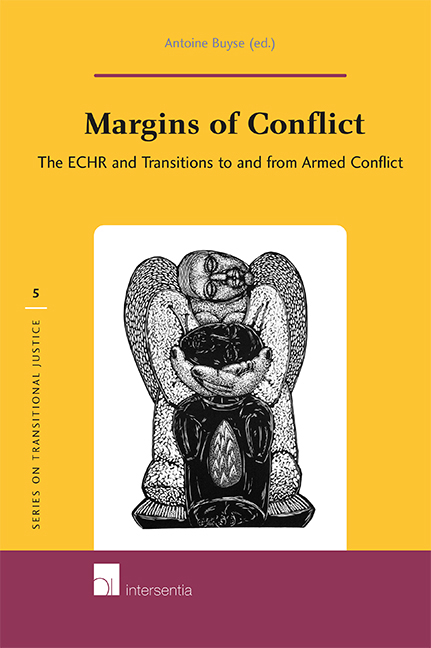Book contents
- Frontmatter
- Preface
- Contents
- Human Rights without Peace? The European Court of Human Rights and Conflicts Between High Contracting Parties
- Crisis Situations, Counter Terrorism and Derogation from the European Convention of Human Rights. A Threat Analysis
- Really Out of Sight? Issues of Jurisdiction and Control in Situations of Armed Conflict under the ECHR
- The Use of Interim Measures Issued by the European Court of Human Rights in Times of War or Internal Conflict
- Foretelling the future, facing the past. Hate speech and conflict situations under the ECHR
- The Duty to Take Preventive Operational Measures. An Adequate Legal Tool to Hold States Responsible in Enforced Disappearance Cases?
- Airborne or Bound to Crash? The Rise of Pilot Judgments and Their Appeal as a Tool to Deal with the Aftermath of Conflict
Crisis Situations, Counter Terrorism and Derogation from the European Convention of Human Rights. A Threat Analysis
Published online by Cambridge University Press: 16 December 2020
- Frontmatter
- Preface
- Contents
- Human Rights without Peace? The European Court of Human Rights and Conflicts Between High Contracting Parties
- Crisis Situations, Counter Terrorism and Derogation from the European Convention of Human Rights. A Threat Analysis
- Really Out of Sight? Issues of Jurisdiction and Control in Situations of Armed Conflict under the ECHR
- The Use of Interim Measures Issued by the European Court of Human Rights in Times of War or Internal Conflict
- Foretelling the future, facing the past. Hate speech and conflict situations under the ECHR
- The Duty to Take Preventive Operational Measures. An Adequate Legal Tool to Hold States Responsible in Enforced Disappearance Cases?
- Airborne or Bound to Crash? The Rise of Pilot Judgments and Their Appeal as a Tool to Deal with the Aftermath of Conflict
Summary
INTRODUCTION
THE SUBJECT OF THIS CONTRIBUTION FROM A HISTORICAL PERSPECTIVE
The one provision in the European Convention on Human Rights (ECHR) most explicitly focusing on crisis situations is Article 15. This Article provides for the derogation of certain Convention rights during times of war or other public emergency. In this contribution the way the European Court of Human Rights is supervising the use of this derogation clause by the Contracting States is analyzed. How did the Court interpret the separate provisions of this Article? Which level of scrutiny did it apply? And, does this interpretation and level of scrutiny affect the European human rights protection in the post-9/11 era?
From time immemorial governments have tried to come to an organized response to crises, political violence or acts of terrorism in the form of emergency rules or the implementation of a state of emergency. The solution has often been found in assigning special powers to the (head of the) Executive, in appointing a special official to cope with the emergency situation (e.g. the Roman dictatorship) or in transferring civil powers to military authorities (e.g. the British martial law and the French état de siège). History shows that from the earliest development of emergency regimes, these regimes provide for the infringement of the rights and freedoms of citizens: at first mainly the infringement of property rights and the deviation from the normal system of justice, later also the infringement of other rights. Actually, the manner in which the dictatorship in the Roman Republic was organized has long been taken as an example of a good set of rules for states of emergency. This is because of its fairly strictly formalized, controlled and time-limited nature which preserved, as much as possible, both the return to ordinary governmental structures and the liberty of individuals. This appreciation for the Roman dictatorship has also influenced the way in which the derogation clauses in post-World War II constitutions and in human rights treaties like the ECHR and the International Covenant on Civil and Political Rights (ICCPR, which contains a derogation clause in Article 4) have been structured and interpreted.
- Type
- Chapter
- Information
- Margins of ConflictThe ECHR and Transitions to and from Armed Conflict, pp. 35 - 56Publisher: IntersentiaPrint publication year: 2010
- 1
- Cited by

